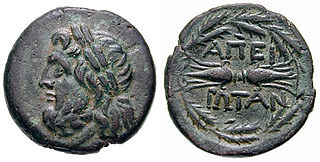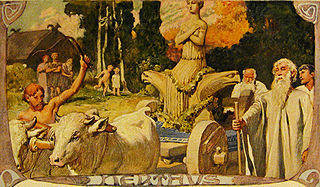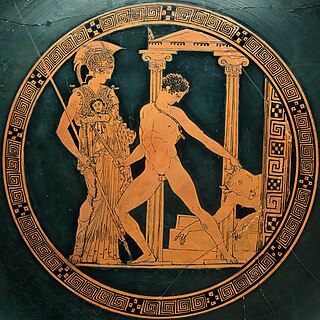Related Research Articles

A thunderbolt or lightning bolt is a symbolic representation of lightning when accompanied by a loud thunderclap. In Indo-European mythology, the thunderbolt was identified with the 'Sky Father'; this association is also found in later Hellenic representations of Zeus and Vedic descriptions of the vajra wielded by the god Indra. It may have been a symbol of cosmic order, as expressed in the fragment from Heraclitus describing "the Thunderbolt that steers the course of all things".

Hindu mythology is the body of myths attributed to, and espoused by, the adherents of the Hindu religion, found in Hindu texts such as the Vedas, the itihasa the Puranas, and mythological stories specific to a particular ethnolinguistic group like the Tamil Periya Puranam and Divya Prabandham, and the Mangal Kavya of Bengal. Hindu myths are also found in widely translated popular texts such as the fables of the Panchatantra and the Hitopadesha, as well as in Southeast Asian texts.

Chinese mythology is mythology that has been passed down in oral form or recorded in literature throughout the area now known as Greater China. Chinese mythology encompasses a diverse array of myths derived from regional and cultural traditions. Populated with engaging narratives featuring extraordinary individuals and beings endowed with magical powers, these stories often unfold in fantastical mythological realms or historical epochs. Similar to numerous other mythologies, Chinese mythology has historically been regarded, at least partially, as a factual record of the past.

The Indigenous peoples of the Americas comprise numerous different cultures. Each has its own mythologies, many of which share certain themes across cultural boundaries. In North American mythologies, common themes include a close relation to nature and animals as well as belief in a Great Spirit that is conceived of in various ways. As anthropologists note, their great creation myths and sacred oral tradition in whole are comparable to the Christian Bible and scriptures of other major religions.

Classical mythology, also known as Greco-Roman mythology or Greek and Roman mythology, is the collective body and study of myths from the ancient Greeks and ancient Romans. Mythology, along with philosophy and political thought, is one of the major survivals of classical antiquity throughout later Western culture. The Greek word mythos refers to the spoken word or speech, but it also denotes a tale, story or narrative.

Germanic mythology consists of the body of myths native to the Germanic peoples, including Norse mythology, Anglo-Saxon mythology, and Continental Germanic mythology. It was a key element of Germanic paganism.

Age of Mythology is a real-time strategy video game developed by Ensemble Studios and published by Microsoft Game Studios. It was released on October 31, 2002 in North America and on November 14, 2002 in Europe.
Baltic mythology is the body of mythology of the Baltic peoples stemming from Baltic paganism and continuing after Christianization and into Baltic folklore.

Virgo (♍︎) is the sixth astrological sign in the zodiac. It spans the 150–180th degree of the zodiac. Under the tropical zodiac, the Sun transits this area between August 23 and September 22 on average. Depending on the system of astrology, individuals born during these dates may be called Virgos or Virgoans.

In mythology and the study of folklore and religion, a trickster is a character in a story who exhibits a great degree of intellect or secret knowledge and uses it to play tricks or otherwise disobey normal rules and defy conventional behavior.

Greek mythology is the body of myths originally told by the ancient Greeks, and a genre of ancient Greek folklore, today absorbed alongside Roman mythology into the broader designation of classical mythology. These stories concern the ancient Greek religion's view of the origin and nature of the world; the lives and activities of deities, heroes, and mythological creatures; and the origins and significance of the ancient Greeks' cult and ritual practices. Modern scholars study the myths to shed light on the religious and political institutions of ancient Greece, and to better understand the nature of myth-making itself.

Norse, Nordic, or Scandinavian mythology, is the body of myths belonging to the North Germanic peoples, stemming from Old Norse religion and continuing after the Christianization of Scandinavia, and into the Nordic folklore of the modern period. The northernmost extension of Germanic mythology and stemming from Proto-Germanic folklore, Norse mythology consists of tales of various deities, beings, and heroes derived from numerous sources from both before and after the pagan period, including medieval manuscripts, archaeological representations, and folk tradition. The source texts mention numerous gods such as the thunder-god Thor, the raven-flanked god Odin, the goddess Freyja, and numerous other deities.
Myth is a genre of folklore consisting primarily of narratives that play a fundamental role in a society. For scholars, this is very different from the vernacular usage of the term "myth" that refers to a belief that is not true. Instead, the veracity of a myth is not a defining criterion.

Roman mythology is the body of myths of ancient Rome as represented in the literature and visual arts of the Romans, and is a form of Roman folklore. "Roman mythology" may also refer to the modern study of these representations, and to the subject matter as represented in the literature and art of other cultures in any period. Roman mythology draws from the mythology of the Italic peoples and shares mythemes with Proto-Indo-European mythology.

Celtic mythology is the body of myths belonging to the Celtic peoples. Like other Iron Age Europeans, Celtic peoples followed a polytheistic religion, having many gods and goddesses. The mythologies of continental Celtic peoples, such as the Gauls and Celtiberians, did not survive their conquest by the Roman Empire, the loss of their Celtic languages and their subsequent conversion to Christianity. Only remnants are found in Greco-Roman sources and archaeology. Most surviving Celtic mythology belongs to the Insular Celtic peoples. They preserved some of their myths in oral lore, which were eventually written down by Christian scribes in the Middle Ages. Irish mythology has the largest written body of myths, followed by Welsh mythology.
References
- ↑ Harva, Uno (1964). The Mythology of All Races: Finno-Ugric, Siberian. Vol. 4. pp. 191–192.